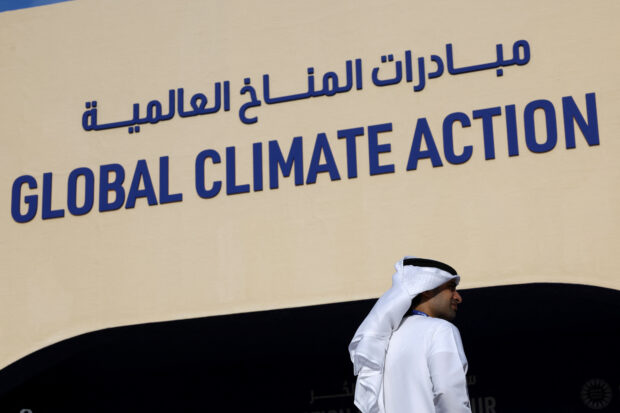
A man in traditional Emirati clothes attends the first day of U.N.’s COP28 climate summit, in Dubai, United Arab Emirates, November 30, 2023. REUTERS/Amr Alfiky
MANILA, Philippines – The poor are among the first to experience the effects of the climate crisis despite being the smallest contributors to it.
This is what some Philippine-based civil society organizations (CSOs) will raise at the United Nations’ (UN) 28th Climate Conference of Parties (COP28) in Dubai, UAE.
Fisherfolk group Pambansang Lakas ng Kilusang Mamamalakaya ng Pilipinas (Pamalakaya), who is set to address COP28 this week, is gearing to raise issues concerning sea-level rise and other climate-induced marine ecological disasters, and will ask accountability from countries that fund “polluting” activities in the Philippines.
“Fishing communities in the Philippines, being an archipelagic country, are one of the first ones to experience the catastrophic climate crisis,” the group said in a statement on Sunday.
The fishers’ group noted that studies show an unprecedented rise in sea level which averages to 8.4 millimeters a year from 1901 until 2022 – three times the global average.
“This phenomenon is already causing inundation of communities, massive and ill-planned displacement, and disruption in traditional fishing practices,” Pamalakaya added.
The group likewise said that it would also express concern over the destruction of fish habitats and marine ecosystems by foreign-funded projects, including reclamation, which results in drastic losses of income for Filipino fisherfolk.
“We will demand for concrete accountability from rich countries who have been the main culprits of the climate crisis and have been funding destructive projects including large-scale mining, land-use conversion, monocrop plantations, dump-and-fill projects, among others that cause degradation of marine resources and socio-economic rights of marginalized farmers and fishers,” the group said.
“This situation has not only incurred damages in our environment, but has also brought losses in our daily livelihood activities, not to mention its impacts to our basic rights. Accountability and reparations must be sought,” Pamalakaya added.
Meanwhile, IBON International pointed out that the climate crisis threatens the human rights of millions of poor people around the world and asked accountability from governments to hold “big polluters” accountable.
“Millions of poor people who have done the least damage to the environment and climate contend with worsening weather extremes and slow-onset disasters: super typhoons, droughts, rising sea levels, and floods,” the group said in its opening statement at COP28.
“Yet world leaders’ ambitions remain grossly inadequate. Several climate talks have passed and governments have done very little to equitably phase-out fossil fuels and hold the big polluters accountable,” the group’s statement continued.
IBON stated that despite hosting numerous climate conferences, the persisting issue is that corporations and “big polluters” can still dictate terms that serve their own interests.
One of the solutions that the group proposed is for the “institutionalisation of measures that will limit corporations’ access to and influence on climate policy making and governance,” saying that the common folk and marginalized groups are the ones who are central to shaping climate policies.
On Thursday, November 30, the UN climate conference finalized the creation of a fund to help compensate countries struggling to cope with loss and damage caused by climate change.
But some climate activists were skeptical that this conference’s fund would reach its target of almost $400 billion, citing the Green Climate Fund as an example.
The Green Climate Fund was first proposed at the 2009 climate talks in Copenhagen and began raising money in 2014 but hasn not come close to its goal of $100 billion annually.
READ: COP28 puts spotlight on turning methane pledges into action
Skeptics also point out that rich countries, such as the United States, should contribute more towards this year’s climate fund.
COP28 began on November 30 and will continue until December 12.